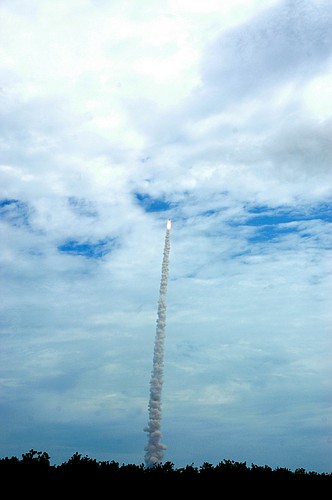- April 25, 2024
-
-
Loading

Loading

The Space Shuttle Atlantis lit its own 6.8 million foot-pound candle at its going away party Friday morning, as it slipped the surly bonds of Earth and touched the face of God one final time.
But when all that still remained was a column of smoke and steam reaching toward the stars, the countless enrapt masses below didn’t race toward their cars and back to reality on a weekday morning. They stood there, staring at that billowing cloud of seared aluminum as it lingered in the haze off Cape Canaveral.
The future of the U.S. space program remains hazy, but we can’t seem to look away. The fascination that drives us to excel everywhere has continued to launch our dreams into orbit and beyond our world.
It’s hard to envision what’s going to come next for NASA and the U.S. space program. Even the program’s top scientists aren’t quite sure yet. What they know is that the space shuttle was already history when the Space Shuttle Endeavour became the last to roll off the assembly line nearly 20 years ago.
But the aging space vehicle program, which ironically brought us to the future in which we now live, has left a legacy that may be hard to live up to, as NASA faces some of the most trying times in its history. Our next launch vehicle will take leaps forward in technology, but will lack much of the capability of the shuttle. The shuttle was too expensive, cried the bean counters in Washington. A red number on a budget line slowly shook our dream of a future beyond our world into reality.
And in that confluence of confusion between America’s idealism as the world leader in the race to the future and the economic realities of one of the worst recessions since the Great Depression, we find ourselves wondering if it’s financially worth it to keep reaching for the stars at all.
That’s something that not one president since the inception of the space program has dared say. In the building Cold War, it became more than a terrifyingly necessary flight of fancy to lead the world into space; it became a national destiny. After President John F. Kennedy’s promise to send us to the moon by the end of the 1960s outlived the man who dreamed it, we kept going.
Yes, at times, we’ve been brought back to reality again and again. We are not yet on Mars, though our satellites and robotic rovers have combed its surface. We do not yet have colonies on the moon, though we've stood upon it multiple times, and dream of returning there.
We have seen farther beyond our galaxy than our forebears ever could hope to do from within the cloudy dome of the Earth, and we still endeavor to see farther. But we have to be willing to pay for it.
That’s not to discount that expense. It’s been massive: Tens of billions of dollars burned in propellant to hurtle millions of pounds of weight into space. But do Americans think it’s worth it?
Take a look at a recent CBS poll and you’ll see numbers pointing overwhelmingly in favor of the space shuttle program, regardless of its expense. “Has the space shuttle program been worthwhile?” the poll asked. Sixty-three percent said yes, compared to thirty-one percent who said no. Though the numbers vary slightly, look at any poll and they say the same thing: Our dream of space has always been worth it.
Friday morning, a few minutes after Atlantis throttled to full power and rocketed off at 17,000 miles per hour and its engines faded to a faint glow, bound for a destiny among the stars, millions still stared. To every achievement, modern man has learned there’s a cost. But in the name of progress, we’re invariably willing to pay. So we gaze beyond that dome of blue, and we dare not look away.